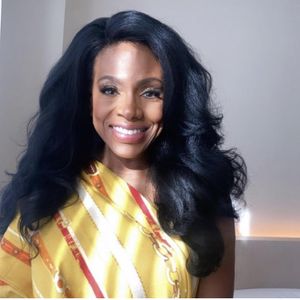
I Grew Closer To God After I Left The Church
I was so over church the day one of the older women in the congregation pulled me aside and basically said my tattoos and piercings made me look like a Jezebel.
No really, she called me a Jezebel. I was through.
I was raised in a church that identified as Baptist, and later went to one that identified as the Church of God in Christ (COGiC). Growing up, I liked reading scriptures and the history of the Bible. I had always been a very spiritually aware person, but one thing that used to throw me off was all of the rules and regulations that, to me, had nothing to do with the Bible. Length of clothing, wearing jewelry and makeup, hairstyles, hobbies and friendships seemed to all be regulated by men and not God.
I understood some "rules" were Biblical, given the seven sins and anecdotal stories in the Bible. Yet, as I grew older, I began to question a lot of things that happened in church that seemed to be more religiously correct motions and not practices that actually reflected a passion to please God, but more so a passion to please people. I continued to go to church, but as I began to challenge and question the religious practices, there seemed to be more and more tension between myself and fellow church-goers, especially the elders.
As I got older, I became more liberated in my way of thinking with topics such as feminism, sex, and self-expression. All of the views I possessed seemed to clash with my "religion". I had (and still have) many homosexual friends, and oftentimes I was questioned/scolded about my allegiance to the LBTQ community (even though I identify as heterosexual). Scripture after scripture and prayer after prayer were used to try to counter my argumentl and I felt that it was my duty not to judge, but love.
I began to study and embrace a feminist mentality, which led to chastising about going against the submissive way of thinking that a woman should have in the relationship with her husband. I didn't particularly think that being submissive to a man was a way to keep him, but the elders of the church thought otherwise. I'd always been fond of tattoos and piercing as forms of self-expression, and opted to utilize those methods as I got older. In return, many of my fellow church members thought the method of my expression meant that I was being sexually deviant and "loose", and that such methods took away from my femininity.
These different viewpoints and ways of thinking ultimately led me to stop going to church altogether.
I felt as though the religious space I was occupying was a space that used rules and regulations as a marker for your relationship with God or how perfect you could make that relationship seem. I didn't understand how following rules set by man could be indicative of whether or not I was following rules set by God. It seemed as though religion was more about pleasing the people you occupy religious spaces with, trying to impress them by how diligently and fervently you could follow religious doctrine and less about being accountable for how you ran your life. I knew people who followed all the rules set by the church but were seemingly breaking all rules set by God: their skirts were the appropriate length and their skin was virgin, yet they were rude, greedy, and had laid with plenty unwed.
After I left the church, I remained without a church home for some years, but continued to maintain my spiritual relationship by reading my Bible regularly, praying, and living life to my fullest by trying everyday to be kind, considerate, and honest. Even by finding my own spiritual path without a shepherd or communing weekly in a temple, I found that I was able to grow by working through my own trials and errors.
I was better able to examine my life and the mistakes I made by viewing myself through an introspective lens; not through the lens of those who were merely judging by how many rules or rituals I didn't live by.
I was better able to clearly see my life's purpose, my areas of spiritual weakness, and things I needed to work on as a member of humanity who happens to call themselves a Christian.
Yes, I did get tattoos, piercings, go out on Friday nights and break “rules" set by a church, but I realized that my true faults here things that were beyond superficial. I was able to work on my patience with others, become more open-minded and more in tune with the emotions and feelings of others. By taking a break from the church, I was able to figure myself out for myself without worrying about judgmental eyes peering over my shoulder.
Though I do miss the concept of a church family and being around people who share the same spiritual beliefs as me, right now I'm in a frame of mind where I feel as though the church I belong to needs to be a space where I can grow in my faith, instead of a place where I feel like I have to follow their rules. While I'm not currently actively searching for a new place of worship, I do hope to find a church family in the future.
Until then, I'll be very careful before aligning myself with a group that goes by "religion" and not by God's word and principles.
xoNecole is always looking for new voices and empowering stories to add to our platform. If you have an interesting story or personal essay that you'd love to share, we'd love to hear from you. Contact us at submissions@xonecole.com.
Featured image by Shutterstock
Originally published October 12, 2017
ItGirl 100 Honors Black Women Who Create Culture & Put On For Their Cities
As they say, create the change you want to see in this world, besties. That’s why xoNecole linked up with Hyundai for the inaugural ItGirl 100 List, a celebration of 100 Genzennial women who aren’t afraid to pull up their own seats to the table. Across regions and industries, these women embody the essence of discovering self-value through purpose, honey! They're fierce, they’re ultra-creative, and we know they make their cities proud.
VIEW THE FULL ITGIRL 100 LIST HERE.
Don’t forget to also check out the ItGirl Directory, featuring 50 Black-woman-owned marketing and branding agencies, photographers and videographers, publicists, and more.
THE ITGIRL MEMO

I. An ItGirl puts on for her city and masters her self-worth through purpose.
II. An ItGirl celebrates all the things that make her unique.
III. An ItGirl empowers others to become the best versions of themselves.
IV. An ItGirl leads by example, inspiring others through her actions and integrity.
V. An ItGirl paves the way for authenticity and diversity in all aspects of life.
VI. An ItGirl uses the power of her voice to advocate for positive change in the world.
Let’s make things inbox official! Sign up for the xoNecole newsletter for daily love, wellness, career, and exclusive content delivered straight to your inbox.
Do You Want To Be A Wife? Or Do You Just Want To Have A Wedding?
Even though it’s my life, sometimes I look at it and totally trip out over certain things.
For instance, even though I am aware that both Hebrew and African cultures put a lot of stock in the name of a child (because they believe it speaks to their purpose; so do I) and I know that my name is pretty much Hebrew for divine covenant, it’s still wild that in a couple of years, I will have been working with married couples for a whopping two decades — and boy, is it an honor when they will say something like, “Shellie, we’ve seen [professionally] multiple people and no one has been nearly as effective as you have been.”
Yep, me. Little ole’ never-been-married-before me. Yeah, y’all better quit letting people tell you what you’re called to do in this world. That is between you and the One who made you.
Okay, but let me stay on track. When it comes to the engaged couples specifically, who have crossed my path, something that I believe I’ve said to each and every one of them (especially the bride-to-be) is — “You better enjoy every single minute of your wedding day because you deserve a big ‘ole party for all of the work that you’re about to do.” And then I look at the woman as intensely as I can and say, “And you? Remember, you are a bride for a day. You are a wife for the rest of your life.”
Why do I emphasize that point so much? It’s because those two things are not one and the same. Hmph. Let me tell it, a huge reason why 70 percent of divorces are initiated by women, however, is because a lot of them think that it is. And so, in the effort to do my part to help make marriages last longer and cause the divorce rate to go down, I think it’s important for more women to ponder if they really want to be a wife — or if they just want to throw a big party (a wedding), go on a trip (a honeymoon) and not much more than that.
Buckle in. This one might be a bit of a ride (for some, at least).
It’s Time to Stop “Living for the Fairy Tale”
 Giphy
GiphyIf you’ve been reading my content for a while (and if so, thank you), it will not shock you in the least that I’ve spent many years studying the origins of things as they directly relate to marriage. I know that the engagement ring is not about love but about a jewelry company that was about to go bust. So, they came up with the slogan “A diamond is forever” and then made some serious bank from it (you can read about that here).
I know that white wedding dresses have nothing to do with purity and virtue; in fact, women in the Bible often wore lots of bright colors during their more-than-one-day wedding celebrations. Actually, white comes from Queen Victoria making it famous back in the 1840s. I also know that a lot of people were pretty obsessed with evil spirits back in the day because things like wearing a wedding veil and bridesmaids wearing the same dresses were all about hiding from said spirits. Another pretty popular wedding day tradition? Well, I’ll just let you read Insider’s “Here's the horrifying truth about why grooms carry brides across the threshold,” if you’re interested.
And as far as marriage goes, don’t even get me started on the whole “I’m living for the fairy tale” narrative that gets pushed incessantly. I’ve said in other articles before that "fairy tale" literally means “a story, usually for children, about elves, hobgoblins, dragons, fairies, or other magical creatures” and “an incredible or misleading statement, account, or belief.” Who wants to live for childish stories that are incredibly misleading? And the ones that have a character like Prince Charming in it? The Bible literally says that “charm is deceitful” (Proverbs 31:30).
Know what else the Bible says? It states that death and life are in the power of the tongue (Proverbs 18:21). So, what’s up with all of this wedding/marriage rhetoric that’s so popular and also, so… “silly” is the first word that comes to mind, “unrealistic” is the second and “unnecessary” is the third?
Why are there so many expectations, especially when it comes to the wedding day, that push folks to the point where a whopping 49 percent of couples end up going into debt right after jumping the broom — all because they wanted to live for the fairy tale and throw a big party that they basically couldn’t afford? SMDH.
It really is wild, just how much human nature tends to do things without even really knowing WHY it does it — even when it comes to marriage. And so, if you are someone who desires this type of union, be honest with yourself: what is your “why”?
When it comes to becoming a wife someday, WHY do you want to do that?
A man needing to spend three times his salary on an engagement ring, WHY?
When it comes to having a big traditional wedding, WHY is it necessary?
Marriage is a goal for you (and don’t get me wrong, marriage is a beautiful thing) — WHY is that the case?
When it comes to being married, WHY do you think it will better serve you than your single state?
Motivational speaker Eric Thomas once said, “When you find your ‘why’, you will find a way to make it happen.” And when it comes to something as big (and supposed to be lifetime lasting) as marriage, perhaps a big part of the reason WHY so many of them do not go the distance is because there aren’t enough “why” questions, on the front end, that are asked (which is why you should partake in premarital counseling before your wedding day). Oh, but there should be.
Because saying “why” you want a huge wedding is nothing more than “because I want to” or “why” you chose the man that you did is simply “I love him” — I’ve been doing this couples work thing long enough to assure you that those answers simply aren’t good enough. You need to know what it means to be a wife and why a marriage and a wedding are not the same thing…not by the longest country mile that you can imagine.
What It Means to Be a Wife
 Giphy
GiphyIf you’ve been reading my content for a while now, you know that I’m good for throwing some Scripture in; it’s a part of my foundation and I make no apologies for it. And so, when it comes to what it means to be a wife, the first word that’s used to define it in the Bible is “helpmate” (Genesis 2:18). A helpmate is a companion, a helper and someone who assists another individual — in this case, a husband.
While we’re here, a helper is not helping unless the help is actually needed and it’s good. Lawd, I can’t tell you how many wife clients I’ve had who have totally missed that part. So, what does “good help” look like?
- A good helper ASKS the person they are assisting what they need.
- A good helper does not try to control another person or make them do what they want.
- A good helper gets that needs can shift based on what is transpiring at any given time.
- A good helper makes things easier and less stressful.
- A good helper learns how to master good listening, effective communication, and wise timing.
And yes, in many ways, this is what it means to be a good wife. So, if you are someone who desires marriage, when it comes to what is required to be not just a wife but a GOOD WIFE, how much have you factored helping your man into the dynamic?
Not mothering him. Not bossing him around. Not trying to manipulate him into being a version of a husband that you would prefer. No, how much thought have you put into “Am I equipped to help another person be their best self? Am I ready to be supportive, encouraging, and nurturing? Was it even modeled to me, while growing up, to know what a proper helpmate looks like? Have I realized how much sacrifice goes into that type of role? Am I even selfless enough to be a consistent helper?”
I know this is probably gonna ruffle some feathers yet, you know something that I’m not big on? Women saying that their man should give them the “princess treatment.” Every time I hear that, the first thought that comes to my mind is “Fathers make their daughters princesses while men make their wives a queen” — and little girls are treated differently than grown women. And to that, Proverbs 12:4(NKJV) says, “An excellent wife is the crown of her husband, but she who causes shame is like rottenness in his bones.”
My point? There is a MATURITY that is to come from going from princess to queen. A queen does have more privileges, yet, at the same time, she also has way more responsibility. It’s not about sitting around and being catered to all day long. Queens have work to do — and it’s not always comfortable or pretty. Same thing goes for being a wife.
Y’all, I could go on and on (and on and on and on) about what it means to be a wife in a marriage. For now, I’ll just end this part of the article with, “If you’re not ready to help, each and every day of your relationship, you’re not ready to be a wife.” Plain and simple.
Weddings Are Not Marriages (and Vice Versa)
 Giphy
GiphySo, why do so many people jump brooms (I’m writing this with Black folks in mind first; jumping brooms is for us only), only to turn around and get divorced a few years later? Oh, I could go on and on as well about how a lot of people don’t have much integrity when it comes to the promises that they make. Listen singles, when you’re dating someone, pay very close attention to whether the person you’re seeing keeps their word — and if you do the same.
It makes absolutely no sense to keep letting someone slide when it comes to reneging now, only to act shocked when they do the same thing after saying “I do.” And while we’re here, being a man or woman of your word is a character issue. Maybe folks are not strong in character when it comes to this.
Yet another reason why folks will get all dolled up, stand before God, family, and friends, look someone straight in the eye, and promise to never leave, only to do just that, is because many people honestly don’t see past their wedding (and maybe their newlywed years). That is why you will hear so many people describe their perfect wedding day, down to the last detail, and yet, if you ask what their five-year plan for their marriage is, they have absolutely not one clue.
I mean, I get it — to a certain extent. A wedding is a big party where you get to dress to the nines, have people come to celebrate you and you get to have everything go your way — down to the font on the programs and reception napkins. Oh, but what a “trick” that can be if you think that your marriage is going to move like that, all of the time, moving forward. I liken it to The Bachelor franchise. Who wouldn’t feel like they are falling for someone when they’re able to live in a mansion with no bills, have fantasy dates that cost thousands of dollars, and a big ole’ rock that a famed jeweler donates?
Meanwhile, folks should watchUnREAL (the television series from several years back where some former producers of the franchise talk about what really happens behind the scenes) to get a reality check. To a certain extent, the same thing goes for marriage: while weddings produce this belief that marriage will be one big party where everyone focuses on you and everything goes your way, that isn’t even close to being the reality of being married.
Honestly, the real deal is 1) if you don’t want to learn how to love on a supernatural level; 2) if you don’t want your strengths to be refined and your weaknesses to be challenged; 3) if you don’t want to be held accountable in ways that you would never be if you remained single; 4) if you don’t want to compromise on a daily basis and, 5) if you don’t want to be challenged to become a truly selfless individual — marriage isn’t for you.
You’d be far better off just throwing a big ass party for yourself, just because (and no, I don’t mean marry yourself; you are already “one” with you; no need for that), and call it a day. Spare yourself and another person the heartache of divorce because…divorce is A LOT to go through.
Lawd, I can only imagine how much drama could be spared if folks simply took into their spirit that weddings ARE NOT marriages and marriages ARE NOT weddings. Weddings are a party to celebrate your union — yet your union? That requires daily energy, effort, and time. It’s not a party. It’s a relationship. BIG DIFFERENCE.
Please Don’t Get Married Until You’re Sure That You Want…BOTH
 Giphy
GiphyAnd this is why, whenever someone tells me that they are going to get married, I don’t immediately respond with, “Congrats! That’s awesome.” NOPE. The very first thing that comes out of my mouth is something along the lines of, “For real. Why?” WHY? Because, it never fails that, about 7.5 times outta 10, folks will be caught off guard and say, “What do you mean ‘why’?” and then follow that up with, “Because I’m in love” or…they don’t really know what to say at all.
Is being in love a good answer? I mean, it explains why you picked the person that you did; it doesn’t really explain why you are choosing to commit to them for the rest of your life, on a marital level, though. Are you getting married because you know that the two of you will make each other better people? Are you getting married because you want to raise your children in a two-parent dynamic? Are you getting married for biblical reasons like wanting to love like Christ loves his bride (the Church and the Church sent him through A LOT — Ephesians 5)?
Are you getting married because you think you’ve gone as far as you can in your evolution as an individual without the assistance of another? Are you getting married because you want to serve another person as they do the same for you (perhaps not in the same ways because you’re both different people)?
Is that asking the most? Chile, that’s not asking enough. I don’t care how much people mock marriage in the media by changing partners like they change cars or homes. I don’t care how much divorce has been normalized. I don’t care how much folks like to act like a husband is a 2.0 boyfriend (it’s not) and having a wife is a 2.0 girlfriend (it’s not) — marriage is special, sacred, and needs to be honored as such. A wedding should be seen as a happy occasion where two people publicly acknowledge what I just said…not simply a time to get a lot of attention and presents only to come home and go from heaven to hell in six months.
And honestly, that’s a bit part of the reason why I do what I do: it’s because I actually think the covenant of marriage is SO MAGNIFICENT that I want to make sure that people know, as much as possible, what they are signing up for — not an endless wedding; a very real relationship that will challenge them and mature them like nothing else ever will in this lifetime.
____
This was a lot. I already know. Still, it beats spending thousands of dollars on a wedding to stand before a chaplain only to spend thousands of more dollars several years later on a divorce lawyer and therapy while standing before a judge.
Weddings are awesome; you’ll get no argument from me there. Still, I think if I was to narrow all of this down into one statement, it would simply be this: “When it comes to marriage, if the thought of being a wife doesn’t excite you more than being a bride — wait. You’re not ready yet.”
Thank me later, sis. YOU WILL.
Let’s make things inbox official! Sign up for the xoNecole newsletter for daily love, wellness, career, and exclusive content delivered straight to your inbox.
Featured image by CoffeeAndMilk/Getty Images









